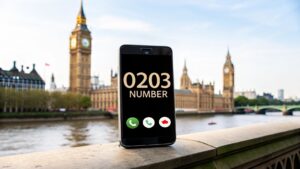So, what exactly is a VoIP number? Think of it as a real phone number that runs over your internet connection instead of a traditional, physical phone line. It looks and works just like any other number, but its secret weapon is the incredible flexibility it offers by not being tied to one specific location.
What is a VoIP Number?
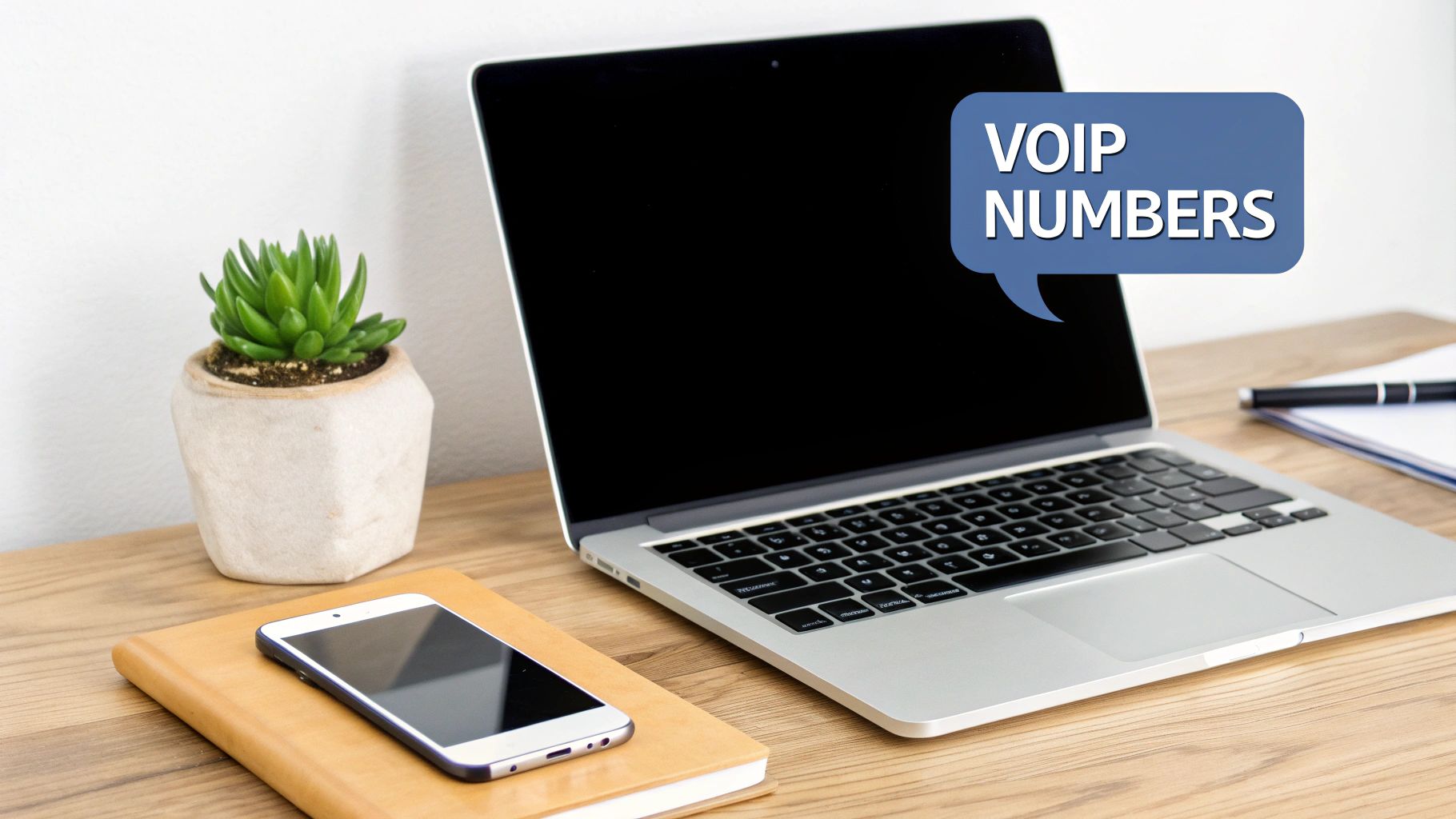
A great way to understand a VoIP number is to think of it like an email address, but for your voice calls. You can "log in" and use it from anywhere you have an internet connection—be it your smartphone, laptop, or a dedicated desk phone. The term “VoIP” stands for Voice over Internet Protocol, which is simply the technology that converts your voice into digital data and sends it across the web.
This is the main reason why countless UK businesses are moving away from their old-fashioned copper-wire landlines. It’s not just a trend; it's a smarter way to handle business communications.
Because it isn't physically attached to one building, a VoIP number gives you the freedom to run your business from anywhere. You can have a London "020" number while working from a co-working space in Manchester, or even from your home office.
This shift towards more agile communication has been happening for years. To give you some perspective, between 2012 and 2017 alone, the volume of landline calls in the UK dropped from a massive 103.1 billion minutes to just 53.6 billion minutes. You can dive deeper into UK VoIP adoption statistics to see the full story behind this change.
To get a clearer picture of why VoIP is becoming the new standard, let's compare it directly to the traditional phone system you're probably used to.
VoIP Number vs Traditional Landline at a Glance
This table breaks down the key differences between a modern VoIP setup and an old-school landline.
| Feature | VoIP Number | Traditional Landline |
|---|---|---|
| Connection | Requires an internet connection (broadband, Wi-Fi, 4G/5G). | Relies on a physical copper wire connected to a specific address. |
| Location | Completely location-independent. Use it anywhere with internet. | Tied to a single physical location. Cannot be moved easily. |
| Hardware | Works on smartphones, computers, or special VoIP phones. | Requires a specific, compatible landline telephone. |
| Flexibility | High. Easily forward calls, add numbers, and use advanced features. | Low. Basic features like call waiting often cost extra. |
| Cost | Typically lower, with no line rental and cheaper call rates. | Involves line rental fees and often higher per-minute call costs. |
As you can see, the advantages of using a VoIP number quickly stack up, especially for a modern, forward-thinking business.
In short, a VoIP number gives you a clear advantage over a standard phone line:
- Location Independence: Take and make calls on your business number from any device that’s connected to the internet.
- Cost Efficiency: It often eliminates expensive line rental fees and usually comes with more affordable call packages.
- Professional Image: You can easily set up local, national, or even toll-free numbers to build credibility and trust with your customers.
How Your Voice Travels Across the Internet
So, how does your voice actually travel across the internet instead of a traditional phone line? It’s a clever process, but surprisingly straightforward.
Imagine you're sending a package. Your voice is first broken down into tiny digital 'packets' of data. Each small packet is then sent on its own journey across the internet, finding the fastest route to its destination. When all the packets arrive, they're instantly put back together in the correct order. The result? The person on the other end hears your voice clearly and seamlessly, all in a fraction of a second.
The Three Key Ingredients for a VoIP Call
To make all this happen, you only need three main things. It’s a world away from the old days of tangled copper wires and physical telephone exchanges.
- A Stable Internet Connection: This is the digital highway for your voice packets. A reliable broadband, Wi-Fi, or even a good 4G/5G mobile connection is all it takes to get crisp, high-quality calls.
- A VoIP Provider: This is the company that supplies your VoIP number and service. Think of them as the digital postal service for your calls—they handle all the technical work of converting your voice into data and routing it to the right place.
- A VoIP-Enabled Device: You’re no longer tied to a desk phone. You can make and receive calls on the devices you already use every day, like your smartphone (via an app), your laptop, or a special VoIP handset.
This image provides a great visual breakdown of how your voice is captured, digitised, and sent across the internet.
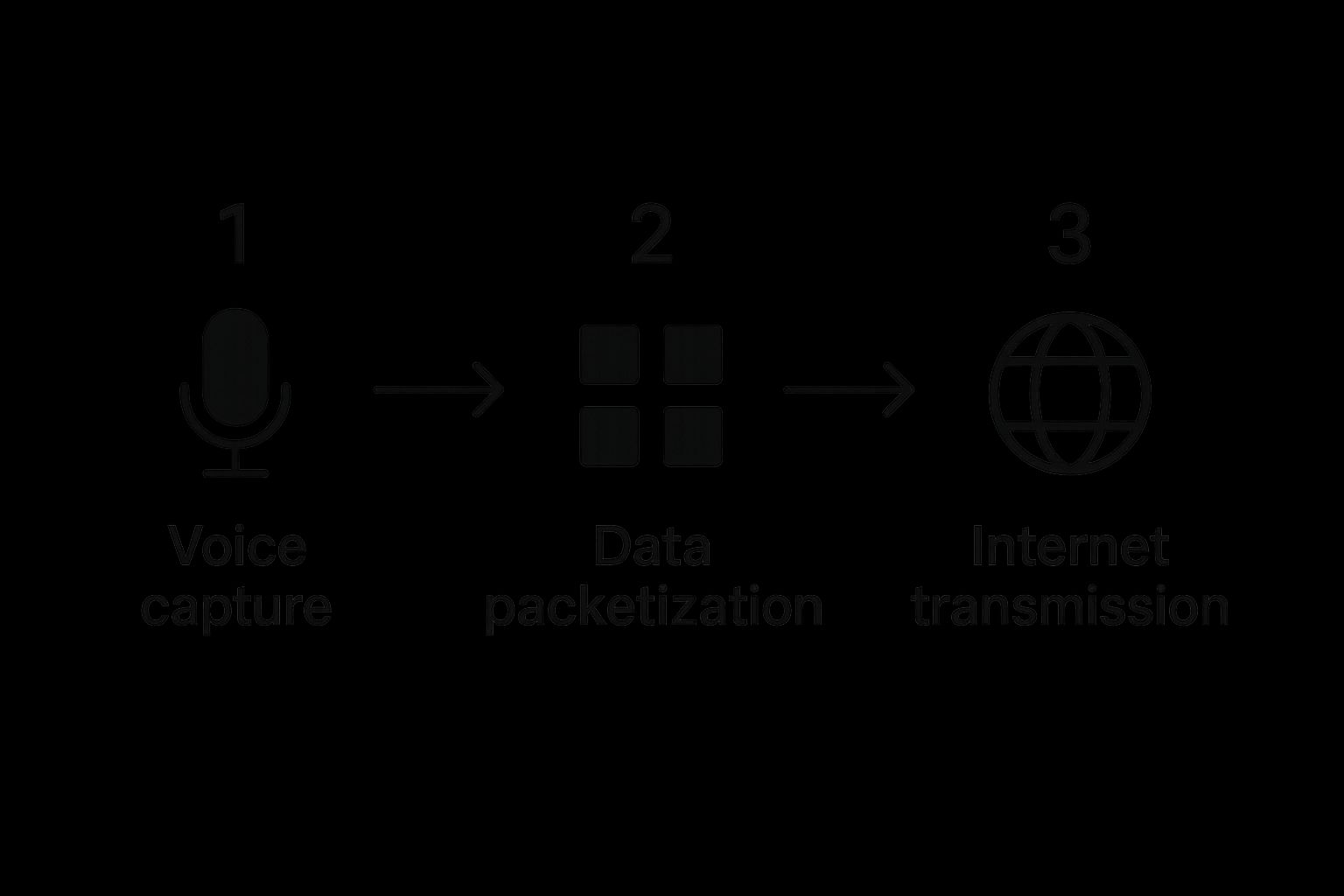
As the infographic illustrates, the journey has three stages: capturing your voice, sending it digitally, and reassembling it at the other end. It’s this process that frees your business communications from a single, physical location. You gain the power to connect from anywhere, on any device, making it a perfect fit for today's flexible working culture.
Why UK Businesses Are Making the Switch
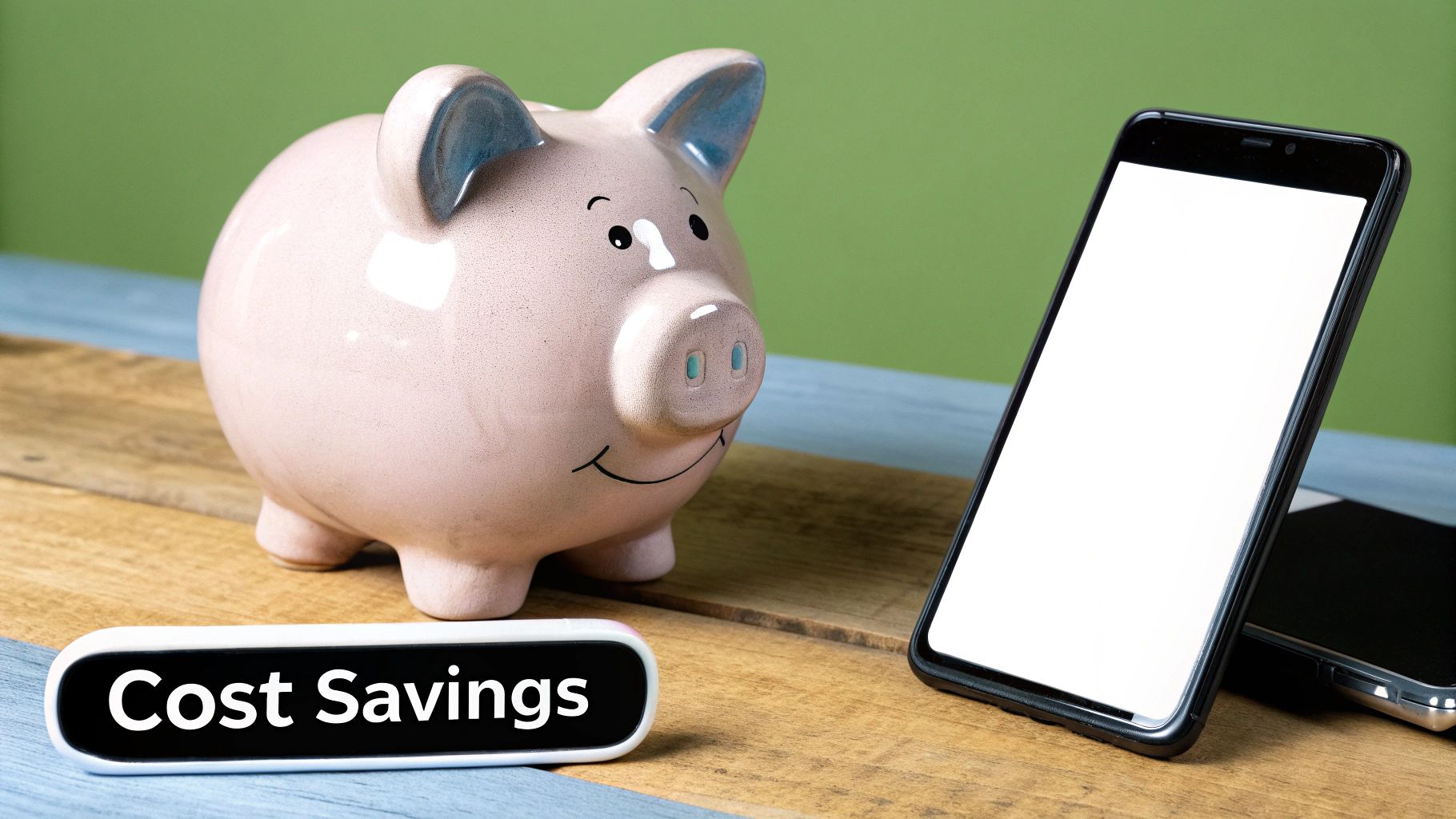
It’s one thing to understand how a VoIP number works, but it’s another to see why so many UK businesses are actively choosing to make the change. This isn't just about adopting the latest tech; it’s a smart business decision that delivers real, tangible benefits to how a company operates.
One of the biggest motivations is, without a doubt, significant cost savings. Old-school phone systems are known for their hidden costs—pricey line rental fees and high per-minute rates, especially for international calls. VoIP eliminates the need for a physical line entirely, which means that rental fee is gone from day one.
This is not a small trend; it’s a major shift in the UK's business landscape. Market forecasts predict the UK's expanding VoIP market will grow by around USD 5.3 billion between 2024 and 2029. This growth is driven by businesses that need the flexibility and cost-efficiency that traditional systems simply can't provide.
The Power of Flexibility and Scalability
Beyond the money it saves, VoIP offers a level of flexibility that is perfectly suited for the modern workplace. With a VoIP number, your business phone is no longer chained to a desk. Your team can make and take professional calls from anywhere with an internet connection—on their laptops, smartphones, or tablets. This is a game-changer for remote employees, hybrid teams, and anyone who isn't tied to a single office.
A VoIP number untethers your business from a physical location. It’s a communication tool that grows and adapts with you, not a system that holds you back.
This freedom leads directly to another major benefit: effortless scalability. Your phone system should be able to grow with your business, not slow it down.
- Growing Your Team? You can add new users and phone numbers in just a few clicks through an online dashboard. No more waiting days for an engineer.
- Seasonal Peaks? Easily increase your lines during busy periods and scale back down when things quieten. You only pay for what you need, when you need it.
- New Locations? Thinking of expanding into a new city? You can instantly get a local number for that area, establishing a local presence without the expense of a physical office.
Ultimately, VoIP is much more than a replacement for an old landline. It’s a dynamic tool that actively supports your business’s growth and agility.
Choosing the Right Type of VoIP Number
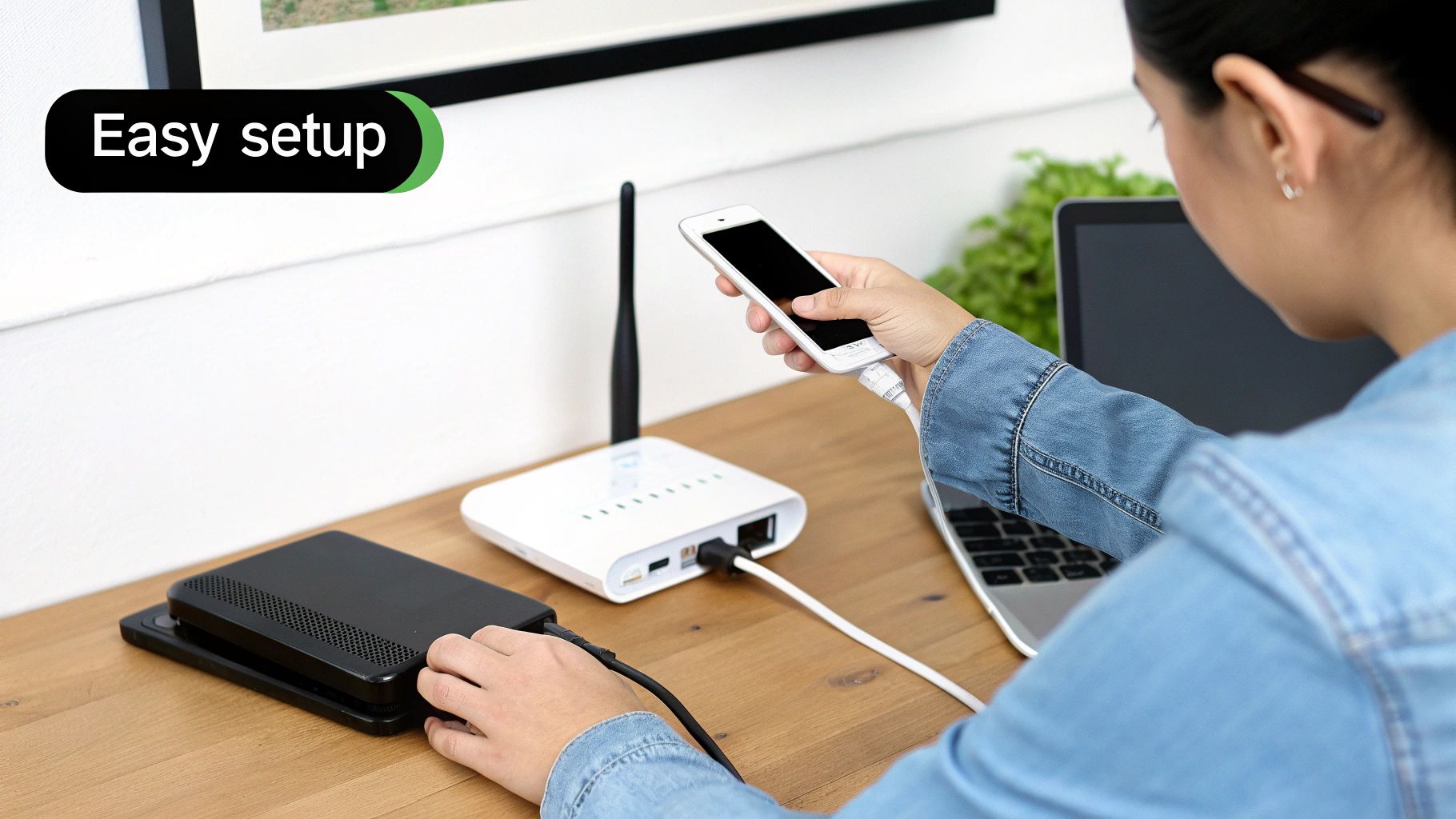
Once you understand what a VoIP number is, the next step is choosing the right one for your business. This is an important decision because the type of number you choose sends a clear message to your customers.
Your choice helps shape your brand's perception. Are you the friendly local expert, a solid national company, or the go-to business that’s always easy to contact? Let’s look at the main options.
Project a Local Presence
If you want to build trust in a specific town or city, a local number is the way to go. Think of an 020 number for London or an 0161 for Manchester. There's a powerful psychological effect here; people are naturally more inclined to call a number that looks familiar and local.
This is a smart way to create a "virtual office" in a new area without the high cost of renting a physical space. You could be running your business from hundreds of miles away, but to your customers, you’re right around the corner.
Establish a Nationwide Identity
If your customers are spread across the UK, then a national number (like an 0333) is a fantastic choice. Because these numbers aren't tied to any single location, they give your business an immediate sense of professionalism and scale. It tells callers you're a serious, nationwide operation, not just a small local firm.
A national number removes any geographical bias, making you just as appealing to a customer in Aberdeen as one in Plymouth. It’s the perfect choice for e-commerce brands, national consultancies, and service providers with a country-wide reach.
Remove Barriers for Customers
For sales hotlines or customer support lines, you want to make it as easy as possible for people to reach you. That’s where toll-free numbers (which start with 0800 or 0808) are invaluable.
They are completely free for your customers to call from any UK landline or mobile, which eliminates any hesitation about the cost of the call. It’s a thoughtful touch that shows you value your customers' experience, and in a competitive market, that can make all the difference.
More Than Just a Number: Unlock Powerful Communication Tools
A VoIP number isn't just a replacement for your old landline; it’s your key to a suite of powerful communication tools that traditional phone systems can't offer. These features often come standard with a VoIP package and can give a small business the professional polish of a much larger company.
For instance, you can have a virtual receptionist (also known as an auto-attendant) that greets every caller with a professional, recorded message and directs them to the right person or department. This feature alone significantly boosts your company’s image. It ensures no call goes unanswered and every customer feels valued from the moment they dial. It’s like having a perfect receptionist on duty 24/7.
Take Control with Smart Call Management
Beyond that professional first impression, VoIP numbers give you incredible control over how your calls are managed. This is where you can see a real difference in your day-to-day efficiency.
-
Intelligent Call Routing: Set up custom rules to send calls exactly where they need to go. For example, calls after 5 PM could be sent directly to voicemail, while calls from a specific area code could be routed to your regional sales expert. It’s all about getting the right call to the right person, automatically.
-
Voicemail-to-Email: Forget dialling a number to check your messages. This incredibly useful feature converts your voicemails into audio files (and sometimes text) and sends them straight to your email inbox. You can listen, save, or forward messages just like any other email, which is a massive time-saver.
Many businesses also find call recording to be an essential tool. It's fantastic for quality control, staff training, and meeting any legal compliance needs. Being able to review customer conversations is a powerful way to identify opportunities for improvement.
All these features work together to create a smarter, more responsive phone system. By automating routine tasks and giving you better insight into your calls, a VoIP number allows you to manage customer interactions more effectively, saving you time and improving your service quality.
How to Get a VoIP Number
Ready to get a VoIP number for your business? Great choice. The good news is that it’s surprisingly simple—you don't need to be a tech expert to get set up. In fact, you can go from choosing a provider to making your first call over the internet in just a few minutes.
The first step is to pick a provider that suits your business needs. Once you've done that, the rest of the process is usually handled through a simple online portal that guides you through each step.
Choosing and Setting Up Your Number
Getting started typically involves just a few quick decisions:
- Select Your Number Type: Consider the image you want to project. Do you need a local number for community trust, a national number for a UK-wide presence, or a toll-free number to make it free for customers to call?
- Pick a Plan: Providers usually offer a few different plans based on your expected call volume and the features you need, so you can easily find one that fits your budget.
- Activate and Go: After you've made your choices, your new number can be up and running almost immediately.
One of the biggest questions people ask is whether they need a new number or if they can keep their existing one. If your current business number is well-known, you can absolutely bring it with you. This process is called porting, and it's designed to move your number to the new VoIP service smoothly, with no disruption for your customers.
Your Top Questions About VoIP Numbers Answered
Even with all the benefits laid out, it’s natural to have a few practical questions before making the switch. That's perfectly understandable—changing something as crucial as your business phone system is a significant decision.
Let's address some of the most common queries people have about VoIP numbers. The aim is to clear up any lingering doubts and help you feel confident about how it all works.
Can I Rely on the Call Quality?
This is often the first question people ask: "Will the calls actually sound good?" Many worry it will be like the crackly, delayed internet calls from the early days of the web.
The reality is, the technology has come a long way. Today's broadband and mobile data connections are more than capable of handling crystal-clear voice conversations. In most situations, you won't hear any difference between a VoIP call and a traditional landline. In fact, the quality can sometimes be even better.
Just How Secure Is It?
"Since it’s over the internet, is it safe?" That's another valid concern. Security should be a top priority for any business.
Reputable VoIP providers take this very seriously. They use strong encryption to scramble your call data, keeping your conversations private. Think of it as a secure, digital line for your voice. This makes it just as secure, and often more so, than old-fashioned analogue phone lines that could be physically tapped.
It's important to choose a trusted provider, as some less reputable services have been used in phishing scams. Scammers sometimes use VoIP numbers to hide their identity in "callback phishing" attacks, tricking people into calling them about a fake problem. This highlights the importance of partnering with a security-focused provider for your business communications.
What Happens if My Internet Cuts Out?
This is a smart question to ask. What’s the backup plan?
- Internet down? No problem. Most professional VoIP systems have a clever fail-safe. You can configure it to automatically forward incoming calls to a designated mobile number or another landline if your internet connection fails. This ensures you never miss that important customer call.
- Do I need ultra-fast fibre? Not necessarily. What matters more than raw speed is having a stable and consistent connection. A standard business broadband package usually has more than enough bandwidth to support excellent VoIP quality for a small team.
We've tackled the most common concerns, but you might have other questions. This quick reference table answers a few more.
Frequently Asked Questions
| Question | Answer |
|---|---|
| Can I keep my existing business number? | Yes, absolutely. In most cases, you can "port" your current landline or mobile number over to a VoIP service, so your customers don't have to learn a new one. |
| Is it difficult to set up? | Not at all. With a user-friendly service, you can be up and running in minutes. It's designed to be simple, with no technical expertise required. |
| Do I need special equipment? | To use a virtual number on your mobile, you don't need anything extra. For a full office setup, you might use VoIP-compatible desk phones, but many businesses simply use a softphone app on their computers and mobiles. |
| How much data does a VoIP call use? | It's surprisingly little. A typical VoIP call uses about 1MB of data per minute, so it won't put a major strain on your internet connection or mobile data plan. |
Hopefully, this gives you a much clearer picture of how practical and reliable VoIP numbers are for modern businesses. It's a technology built for flexibility and resilience.
Ready to separate your personal and business communications on one device? With Business Numbers Direct, you can get a dedicated virtual number for WhatsApp Business in minutes, all for just £7.99 a month with no contract. Get your business number today.


